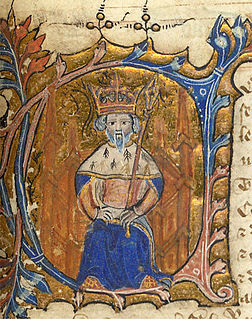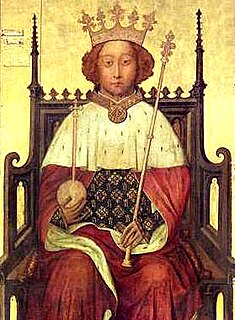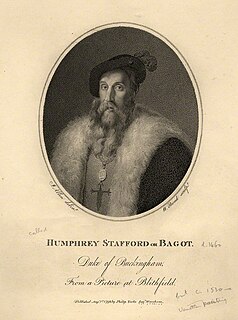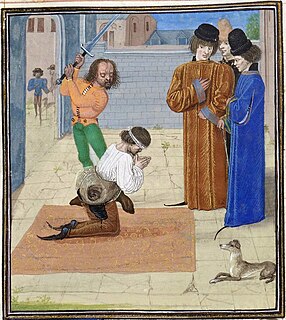Related Research Articles

Edward III, also known as Edward of Windsor before his accession, was King of England and Lord of Ireland from January 1327 until his death in 1377. He is noted for his military success and for restoring royal authority after the disastrous and unorthodox reign of his father, Edward II. Edward III transformed the Kingdom of England into one of the most formidable military powers in Europe. His fifty-year reign was one of the longest in English history, and saw vital developments in legislation and government, in particular the evolution of the English Parliament, as well as the ravages of the Black Death. He outlived his eldest son, Edward the Black Prince, and the throne passed to his grandson, Richard II.

Richard II, also known as Richard of Bordeaux, was King of England from 1377 until he was deposed in 1399. He was the son of Edward, Prince of Wales, and Joan, Countess of Kent. Richard's father died in 1376, leaving Richard as heir apparent to his grandfather, King Edward III; upon the latter's death, the 10-year-old Richard succeeded to the throne.

Richard Neville, 16th Earl of Warwick, known as Warwick the Kingmaker, was an English nobleman, administrator, and military commander. The eldest son of Richard Neville, 5th Earl of Salisbury, he became Earl of Warwick through marriage, and was the wealthiest and most powerful English peer of his age, with political connections that went beyond the country's borders. One of the leaders in the Wars of the Roses, originally on the Yorkist side but later switching to the Lancastrian side, he was instrumental in the deposition of two kings, which led to his epithet of "Kingmaker".

The House of Lancaster was a cadet branch of the royal House of Plantagenet. The first house was created when King Henry III of England created the Earldom of Lancaster—from which the house was named—for his second son Edmund Crouchback in 1267. Edmund had already been created Earl of Leicester in 1265 and was granted the lands and privileges of Simon de Montfort, 6th Earl of Leicester, after de Montfort's death and attainder at the end of the Second Barons' War. When Edmund's son Thomas, 2nd Earl of Lancaster, inherited his father-in-law's estates and title of Earl of Lincoln he became at a stroke the most powerful nobleman in England, with lands throughout the kingdom and the ability to raise vast private armies to wield power at national and local levels. This brought him—and Henry, his younger brother—into conflict with their cousin King Edward II, leading to Thomas's execution. Henry inherited Thomas's titles and he and his son, who was also called Henry, gave loyal service to Edward's son King Edward III.

Humphrey Stafford, 1st Duke of Buckingham, 6th Earl of Stafford, 7th Baron Stafford, of Stafford Castle in Staffordshire, was an English nobleman and a military commander in the Hundred Years' War and the Wars of the Roses. Through his mother he had royal descent from King Edward III, his great-grandfather, and from his father, he inherited, at an early age, the earldom of Stafford. By his marriage to a daughter of Ralph, Earl of Westmorland, Humphrey was related to the powerful Neville family and to many of the leading aristocratic houses of the time. He joined the English campaign in France with King Henry V in 1420 and following Henry V's death two years later he became a councillor for the new king, the nine-month-old Henry VI. Stafford acted as a peacemaker during the partisan, factional politics of the 1430s, when Humphrey, Duke of Gloucester, vied with Cardinal Beaufort for political supremacy. Stafford also took part in the eventual arrest of Gloucester in 1447.
Kenneth Bruce McFarlane, FBA was one of the 20th century's most influential historians of late medieval England. He was born on 18 October 1903 and was the only child of A. McFarlane, OBE. His father was a civil servant in the Admiralty and the young McFarlane's childhood was an unhappy one. This may have led to the deep melancholy that seemed to pervade much of his adult life. His family sent him to public school at Dulwich College as a day-boy. McFarlane did not particularly like the atmosphere of the public school. In 1922 he earned a scholarship to read history at Exeter College, Oxford. His tutor during these years was C. T. Atkinson. Following the completion of his DPhil on the loans of Cardinal Beaufort to the English Crown, McFarlane became a fellow of Magdalen College, where he remained for the rest of his life. Many of his colleagues and students found him difficult to approach, but to those who could break through the facade he became a great and true friend. McFarlane also found, through the help of his great friend Helena Wright and her family, a home and a family of sorts. In Wright's house he found that he could be himself and find refuge from the daily grind of the University and a place of joy. McFarlane never married.
Louis III, was an Elector Palatine of the Rhine from the house of Wittelsbach in 1410–1436.

John Clifford, 9th Baron Clifford, 9th Lord of Skipton was a Lancastrian military leader during the Wars of the Roses in England. The Clifford family was one of the most prominent families among the northern English nobility of the fifteenth century, and by the marriages of his sisters John Clifford had links to some very important families of the time, including the earls of Devon. He was orphaned at twenty years of age when his father was slain by partisans of the House of York at the first battle of the Wars of the Roses, the Battle of St Albans in 1455. It was probably as a result of his father's death there that Clifford became one of the strongest supporters of Margaret of Anjou, wife of King Henry VI, who ended up as effective leader of the Lancastrian faction.
A balinger, or ballinger was a type of small, sea-going vessel. It was swift and performed well under both sail and oars. It was probably developed in Bayonne for hunting whales. The ships were used in the conquest of Anglesey in 1282. They were also in use in the 15th and 16th centuries. They were distinguished by their lack of a forecastle, and by carrying either a square sail, or a sail extended on a sprit on a single mast. They were generally less than 100 tons, with a shallow draught, and the earlier vessels at least carried 30 or more oars for use in sheltered areas or for close fighting. They were mainly used for coastal trade, but could also be used as transports, carrying around forty soldiers. A number were employed in the early Royal Navy for this purpose.

Sir Robert Tresilian was a Cornish lawyer, and Chief Justice of the King's Bench between 1381 and 1387. He was born in Cornwall, and held land in Tresillian, near Truro. Tresilian was deeply involved in the struggles between King Richard II and the Lords Appellant, and was eventually executed for his loyalty to the king.
The New Oxford History of England is a book series on the history of the British Isles. It was commissioned in 1992 and produced eleven volumes by 2010, but as of February 2020, no more volumes. It is the successor to the Oxford History of England (1934–86).

William Bonville, 1st Baron Bonville, was an English nobleman and an important, powerful landowner in south-west England during the Late Middle Ages. Bonville's father died before Bonville reached adulthood. As a result, he grew up in the household of his grandfather and namesake, who was a prominent member of the Devon gentry. Both Bonville's father and grandfather had been successful in politics and land acquisition, and when Bonville came of age, he gained control of a large estate. He augmented this further by a series of lawsuits against his stepfather, Richard Stucley. Bonville undertook royal service, which then meant fighting in France in the later years of the Hundred Years' War. In 1415, he joined the English invasion of France in the retinue of Thomas, Duke of Clarence, Henry V's brother, and fought in the Agincourt campaign. Throughout his life, Bonville was despatched on further operations in France, but increasingly events in the south-west of England took up more of his time and energy, as he became involved in a feud with his powerful neighbour Thomas Courtenay, Earl of Devon.
James Campbell, was a British historian, specialising in the medieval period and the Anglo-Saxons. He was a Fellow of Worcester College, Oxford, from 1957 until his retirement in 2002, and Professor of Medieval History at the University of Oxford from 1996 to 2002.

John Beaumont, 1st Viscount Beaumont, was an English nobleman and magnate from Folkingham, Lincolnshire. He was a councillor to King Henry VI and was rewarded for his services, becoming a leading member of the East Anglian nobility. Beaumont held numerous offices for the crown, and was promoted up the peerage to become the first man with the rank of viscount. He also amassed immense personal wealth, acquired through inheritance, marriage, and royal patronage.
Charles Arthur John Armstrong, known as John Armstrong, was a leading post-war English historian, known for his studies of the First Battle of St Albans and the medieval Duchy of Burgundy.

John Roger Loxdale Highfield was an English historian of medieval Europe and fellow of Merton College, University of Oxford. His contribution to the study of medieval Spain was recognised by his appointment to the Order of Isabella the Catholic in 1989.

The Mountford family were a gentry family which held lands in Coleshill, Warwickshire during the late Middle Ages. They were involved in an inheritance dispute in 1452 which was caused by the disinheritance of a senior line, in favour of the sons of a second wife.

John Smith Roskell (1913–1998) was an English historian of the Middle Ages.
Sir Alan Buxhull K.G. was an English soldier and nobleman.

Sir Edward Hull KG was an English knight who served as Constable of Bordeaux and a military commander during the Lancastrian phase of the Hundred Years' War. Born into a Lancastrian-supporting family, his parents were both members of Henry IV's royal household. Hull became close to Henry VI and his wife, Margaret of Anjou. He served on campaign in France and as an ambassador to European powers. Hull held numerous offices including as Esquire of the Body to the king, Knight of the Body and carver to the queen, a feoffee of the Duchy of Lancaster, justice of the peace and sheriff of both Somerset and Dorset, and Devon.
References
- 1 2 3 "Deceased Fellows". Archived from the original on 5 February 2016.
- ↑ "G. L. Harriss" (listing). UK: Magdalen College. Archived from the original on 11 June 2010. Retrieved 28 October 2009.
- ↑ "A tribute to Gerald L. Harriss, FBA".
- ↑ "Gerald Harriss | Magdalen College Oxford". www.magd.ox.ac.uk. Retrieved 20 June 2021.
- ↑ Harriss, Gerald (2005). Shaping the Nation, England 1360-1461. Oxford. pp. Preface, xix. ISBN 9780199211197.; see also Walker, Simon (1990). The Lancastrian Affinity, 1361-1399. Oxford. ISBN 9780198201748.
- ↑ Young, Charles R. (1977). "review of King, Parliament and Public Finance in Medieval England to 1369 by G. L. Harriss". Am. Hist. Rev. 82 (1): 77. doi:10.1086/ahr/82.1.77.
- ↑ Gillespie, James L. (January 1987). "Review of Henry V: The Practice of Kingship ed. G. L. Harriss". Speculum: A Journal of Medieval Studies. 62 (1): 137–139. doi:10.2307/2852585. JSTOR 2852585.
- ↑ Harriss, G. L. (1993). "Political Society and the Growth of Government in Late Medieval England". Past & Present. 138 (138): 28–57. doi:10.1093/past/138.1.28. JSTOR 651187.
- ↑ Saul, Nigel (19 June 2017). "Review of Shaping the Nation. England 1360–1461 by G. L. Harriss". Reviews in History.